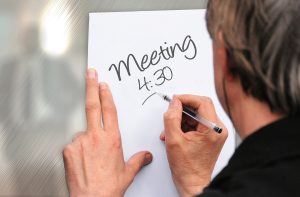How to Lead a Meeting that Doesn’t Suck

“Honey, cancel our dinner plans. I just got invited to a work meeting, and I really want to go to it,” said no one ever. According to Inc. Magazine, 46% of working Americans would rather endure an unpleasant activity, like a root canal or a move to Antarctica, than to participate in a meeting. [1] Our dread of meetings was once satirized by a character on the popular television series “The Office,” who faked going into labor[2] to escape a boring meeting. So what’s the big deal, why do so many people dread going to meetings? The answer, frankly, is that most meetings suck. If you are one of the few people who leads or participates in meetings that don’t suck, here is a great resource by Organizational Strategist, Wayne Hedlund, on 16 Ways To Lead A Bad Meeting.[3] You can use that to up your bad meeting game.
Why are we meeting again?
I think it’s safe to assume that if you are reading this post, then you probably aren’t looking for ways to make your meetings worse. In order to lead an effective meeting, it’s helpful to understand why most people dislike meetings. There are a number of reasons, but in my experience, the three main ones are 1. Lack of a Clear Purpose. 2. Lack of Organization. 3. Lack of Results. Fortunately, there are a ton of resources out there to help lead a meeting to avoid these three pitfalls. In the rest of this article, I will highlight some key meeting practices from industry leaders.
Key #1: Only hold a meeting if it is absolutely necessary

Craig Jarrow, who runs the website managementninja.com says, “don’t call a meeting when you should send an email instead.”[4] Next time you feel the urge to call your team together, ask yourself if you can accomplish the same purpose through an email. It may be faster for you to call your team to your office; but it may disrupt the important work your team members are already doing. To further elaborate on this point, let’s say that it takes you 15 minutes to compose an email of a weekly To Do list for your team. That takes you 15 minutes, and your team can start working on the list as soon as they are able to do so.
If, on the other hand, you call a 15 minute meeting for your 5 member team to assign the To Do list, you lose 15 minutes of productivity from each of your 5 team members – that’s 75 minutes of total productivity loss all because you didn’t want to type an email, for more on time management, read this article. If you want an extreme example of someone who has cut out every bit of unproductive work activity, I highly encourage you to read New York Times Best Seller “The 4-Hour Work Week[5],” by Tim Ferris.
Key #2: Be Prepared
[bctt tweet=”Once you’ve decided that you absolutely need to have a meeting, you need to prepare. As a first order of preparation, you need to determine the purpose of the meeting. ” username=”ridley_cr”]
According to Forbes Magazine, the primary purpose of every effective meeting is to make decisions.[6] Knowing that your goal is to make decisions should guide you as you plan. According to the American Psychological Association, having an agenda with background information sent to all participants well ahead of the meeting time, limiting your meeting to only the people who really need to be there, and planning to keep your meeting to an hour or less, all contribute to an effective meeting[7]. It’s really important for the meeting leader to prepare by knowing the topic or issue that the meeting is about. INC. Magazine says that one of the jobs of the meeting leader is . . . to lead (hopefully that’s not a surprise to anyone)[8].
In order to effectively lead a discussion, a leader must be well versed enough in the topic at hand to effectively discern productive discussions that lead to action from unproductive tangents that needlessly waste time.
Key 3: Make Decisions & Act On Them
In my opinion, the biggest reason that people that people would rather have a root canal than go to a meeting, is because so often meetings feel like a complete waste of time. Nothing gets solved, nothing happens that wasn’t already going to happen, and whatever time you spent in the meeting you are now behind on the work you already needed to get done. Moneywatch lists several effective steps for making decisions and acting on them. First, make a clear decision and identify clear action steps. Second, create accountability – i.e. assign people responsible for the action steps. Finally, publish a meeting recap that only includes the action items and people responsible.[9] Don’t make your team sift through reams of notes to determine what the outcome of the meeting was.
I’d like to offer one closing thought.
If you are reading this, and you are a participant in meetings that suck, know that your boss, manager, company owner probably doesn’t want to lead a bad meeting. No one wakes up in the morning and thinks “I am going to lead a waste of time meeting that everyone hates today.” (If you do work for a person like that, run now.) If you want more out of your meetings, take the bull by the horns. Connect with your manager and ask them if they would like you to prepare an agenda for the next meeting. Or, instead, follow up with an email with action steps, or find some other appropriate way to make the meeting more productive. You might just be the difference between a meeting that sucks, and a productive one.
Sources:
[1] https://www.inc.com/minda-zetlin/17-percent-of-employees-would-rather-watch-paint-dry-than-attend-team-meetings.html
[2] https://youtu.be/46k3frF1V90
[3] http://waynehedlund.org/how-to-lead-a-bad-meeting/
[4] https://timemanagementninja.com/2017/01/dont-call-a-meeting-when-you-should-send-an-email-instead/
[5] https://www.amazon.com/4-Hour-Workweek-Escape-Live-Anywhere/dp/0307465357/ref=sr_1_2?ie=UTF8&qid=1520538054&sr=8-2&keywords=the+4+hour+work+week&dpID=51v5Pje3AtL&preST=_SY291_BO1,204,203,200_QL40_&dpSrc=srch
[6] https://www.forbes.com/sites/glennllopis/2012/12/17/5-ways-to-lead-a-meeting-make-30-decisions-in-30-minutes/#14ea74b87882
[7] http://www.apa.org/gradpsych/2015/11/effective-meeting.aspx
[8] https://www.inc.com/eric-morgan/7-tips-for-leading-meetings-more-effectively.html
[9] https://www.cbsnews.com/news/9-hardcore-steps-to-leading-incredibly-effective-meetings/

